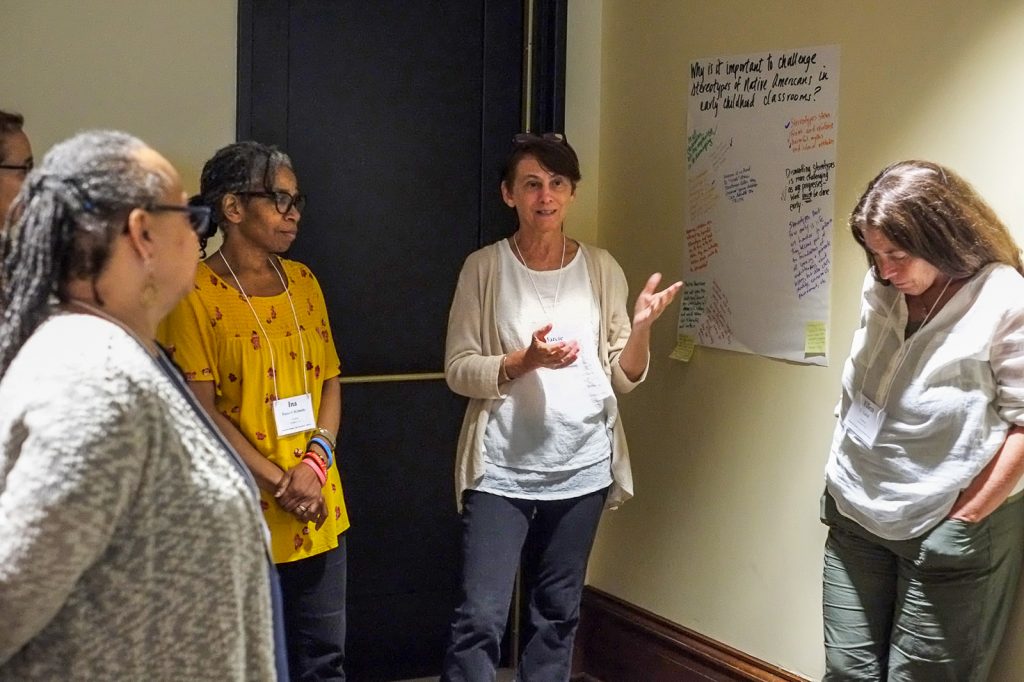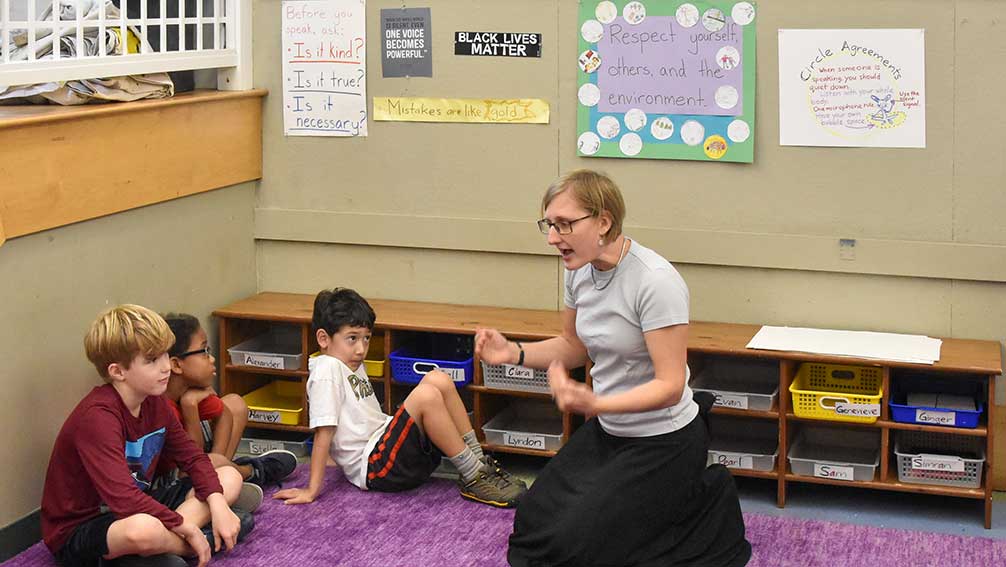New Tenet Affirms Long-held Values at Miquon, Part 2
by Kristin Sanderson with Brenda Lange
Part 2 of 2; Read Part 1
Disrupting Stereotypes
For decades, Miquon has worked to disrupt one-dimensional representations of different cultures in society, especially negative stereotypes. At Miquon, this practice is known as highlighting the Counter Story, or the less dominant narrative. Ensuring classrooms and the school library feature and utilize books that showcase a wide variety of accurate representations of the many Indigenous cultures throughout history and today is just one example of this practice.

At the Indigenous Peoples’ Day Teach-In, “combatting particular stereotypes was something that was emphasized, as well as teaching our students how to recognize them and fight against them,” said Rachel Elin-Saintine, one of Miquon’s five teachers attending the conference.
Currently, she explained, “our students get a thorough understanding of the Lenape, but maybe don’t fully understand distinctions between tribes, and aren’t as familiar with the stereotypes that persist and continue to harm the Native people.”
Sports mascots, costumes and characters shown speaking with limited language skills are just three ways that society often reinforces negative and often incorrect stereotypes about Native Americans in subtle ways.
Such stereotyping is a double-edged sword, according to Wendy Leitner-Sieber, third and fourth grade teacher. “The presence of negative stereotyping and the absence of positive images diminish and even falsify each tribe’s unique identity—who they are and what they believe in and stand for—over time,” she said.
Rachel continued to explain that “throughout the year, we are going to teach our students to be history detectives so they can recognize the author’s perspective, notice whose story is missing, identify historical discrepancies and retell the story from the marginalized perspective.”
She added that telling the counter narrative is an important as a way to dismantle common misconceptions throughout history that have routinely been told from the dominant (European) perspective.
Becoming Upstanders
And as Miquon children are exposed to stereotypes that persist and continue to harm Indigenous Peoples, they become more and more adept at recognizing these stereotypes in everyday life. After their work understanding why these images can be hurtful, Miquon students are not only able to spot harmful stereotypes, they are equipped to speak up and fight against them. This upstander attitude can take many forms, such as letter writing, making posters, and even simply correcting others when they see such stereotypes being used.
“As we study the Lenape, our children develop a strong sense of connection with their culture,” said Wendy. “We spend a lot of time getting to know Lenape history through learning how they used the land where Miquon sits today.”
Miquon students especially feel this connection through the land. At school, they spend a lot of time outdoors, and they have a deep sense of pride over the land here; they view it at their own. Moreover, there are so many avenues for the children to explore their own interests within our social studies, that they often spill over into their free time.
“For example, many students in our 3/4 groups end up spending their outdoor Choice Time grinding black walnuts and mixing it with creek water to make ‘walnut milk.’ Some kids scour the campus for milkweed to turn into rope in the traditional method of the Lenape,” Wendy explained.
“They gain empathy for different cultures, and as they learn to recognize the stereotypes that persist, they are developing the skills needed to act on what they notice, and in doing so, to challenge racism and hate.”
Through their classroom work and their outdoor activities, Miquon children gain a deeper understanding and awareness of both historical and modern day Lenape communities. Because of this bond, Miquon children begin to naturally notice the obvious injustice against Native people they see in media and in stereotypes, as well as damage done to the environment that Native people cared for.

At the end of the day, empathy for others has always been the route Miquon children take to become upstanders and agents of change. The school develops in children a real sense of responsible citizenship, and by the time they graduate in 6th grade, they possess the skills they need to improve the world around them.